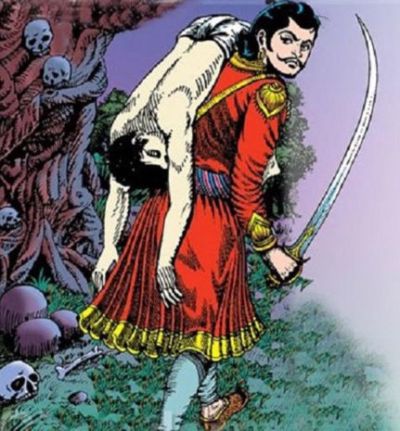Read the previous part here…
“So tell me, o King, who was more noble, Yaśodhana or Baladhara? Who was more praiseworthy?
“Remember, if you know the answer, and don’t tell me the truth, your head will burst into a hundred pieces!“

इति वेतालतः श्रुत्वा मुक्तमौनः स तं नृपः ।
प्रत्युवाच द्वयोर् राजा सत्त्ववान् अधिकस् तयोः ॥ १२,२४.४८ ॥
तद् आकर्ण्यैव वेतालः साक्षेपस् तम् अभाषत ।
सेनापतिः कथं नात्र राजन्न् अभ्यधिको वद ॥ १२,२४.४९ ॥
यस् तथा स्वामिने भक्त्या स्वभार्यां तां तथाविधाम् ।
सुचिरज्ञाततद्भोगसुखास्वादो ऽप्य् उपानयत् ॥ १२,२४.५० ॥
आत्मानं चाग्निसाच् चक्रे तस्मिन् पञ्चत्वम् आगते ।
अनास्वादिततद्भोगस् तत्कान्तां तु जहौ नृपः ॥ १२,२४.५१ ॥
King Vikram broke his silence and replied…
‘Of the two, the king was more noble and praiseworthy.”
The Vetāla replied immediately…
“Why do you say this, O king? How can you be so sure that Baladhara was not more noble and praiseworthy? He knew that his wife was beautiful and devoted, and yet he offered her to the king, just because of his love and devotion to the king.”
“He was so devoted and loyal that he could not bear the death of the king, and so left his own body immediately!”
“The king on the other hand, refused to accept his wife, without even knowing much about her!”
वेतालेनैवम् उक्तस् तु विहस्य स नृपो ऽब्रवीत् ।
यद्य् अप्य् एवं तथाप्य् एतत् किं चित्रं कुलपुत्रकः ॥ १२,२४.५२ ॥
सेनापतिः स भक्त्या यत् स्वाम्यर्थे तत् तथाकरोत् ।
प्राणैर् अपि हि भृत्यानां स्वामिसंरक्षणं व्रतम् ॥ १२,२४.५३ ॥
राजानस् तु मदाध्माता गजा इव निरङ्कुशाः ।
छिन्दन्ति धर्ममर्यादाशृङ्खलां विषयोन्मुखाः ॥ १२,२४.५४ ॥
तेषां ह्य् उद्रिक्तचित्तानाम् अभिषेकाम्बुभिः समम् ।
विवेको विगलत्य् ओघेनोह्यमान इवाखिलः ॥ १२,२४.५५ ॥
क्षिप्यन्त इव चोद्धूय चलच्चामरमारुतैः ।
वृद्धोपदिष्टशास्त्रार्थरजोमशकमक्षिकाः ॥ १२,२४.५६ ॥
आतपत्रेण सत्यं च सूर्यालोको निवार्यते ।
विभूतिवात्योपहता दृष्टिर् मार्गं च नेक्षते ॥ १२,२४.५७ ॥
ते ते च विपदं प्राप्ता मारमोहितचेतसः ।
जगद्विजयिनो ऽपीह राजानो नहुषादयः ॥ १२,२४.५८ ॥
एषो राजा पुनः पृथ्व्याम् एकच्छत्रो ऽपि यत् तया ।
उन्मदिन्या चपलया लक्ष्म्येव न विमोहितः ॥ १२,२४.५९ ॥
प्राणान् अपि स धर्मात्मा तत्याज न पुनः पदम् ।
अमार्गे निदधे धीरस् तेनासौ मे ऽधिको मतः ॥ १२,२४.६० ॥
इत्य् आकर्ण्य नृपस्य तस्य वचनं भूयस् तदंसस्थलाद्
वेतालः सहसा स्वम् एव स पदं मायाप्रभावाद् ययौ ।
राजाप्य् अन्वसरत् तथैव स पुनः संप्राप्तुम् एतं जवाद्
आरब्धे हि सुदुःकरे ऽपि महतां मध्ये विरामः कुतः ॥ १२,२४.६१ ॥
King Vikram laughed aloud, and said…
“While what you say is true, what is so special in the fact that a devoted servant of the king, a person from a good family, acted for his master’s well-being, out of concern and love for him?”
“It is said that loyal servants protect their masters even at the cost of their own lives.”
“Most kings, on the other hand, are arrogant, and uncontrollable like elephants in musth, and always looking for enjoyment and pleasure, even at the cost of Dharma.”
“It is almost as if their powers of discretion are swept away in the flood of the holy water that is poured on their heads at the time of consecration.”
“The dust of the knowledge that they gain at the feet of elders, is down away by the breeze of self-fulfillment. The royal umbrella that protects their heads from the heat, also keeps them away from the harsh rays of satya, the truth.”
“Their eyes are mesmerized by riches, and fail to see the right path to follow.”
“Not just ordinary kings, even great warrior kings like Nahuṣa have had their minds stuck by Māra (the personification of evil and temptation) , which led to their eventual downfall.”
“But Yaśodhana, even though he ruled the kingdom, and was swayed by Unmādinī, much like people are swayed by the short-lasting Devi of wealth…he did not give up the path of Dharmā, and preferred to give up his life instead.”
“And this is why he is more praiseworthy, and I consider him to be more noble in character, of the two.”
As the king uttered these words, the Vetāla flew off his shoulder, laughing. And King Vikram once more started to walk towards the banyan tree, determined to fetch him.
It is rightly said…
आरब्धे हि सुदुःकरे ऽपि महतां मध्ये विरामः कुतः?
How can great men leave in the middle of a task that they have begun, even though it be very difficult?
to be continued…
